It’s been a long term of Court, the third with the full wave of Trump appointees‚ Neal Gorsuch, Brett Kavanaugh and Amy Coney Barrett on the bench. It’s increasingly clear that the conservative justices’ ability to ignore doctrines like standing so it can hear cases it wants to and to look past established precedent so it can reach desired results will be the hallmark of the Roberts Court. And it’s often mean-spirited, ignoring the impact the conservative agenda has on the lives of real people who have looked to the law for decades to protect them and their civil rights. Mike Luckovich of the Atlanta Journal-Constitution nailed it, as he so often does, when it came to the affirmative action cases that were decided last week.
As if the death of affirmative action wasn’t enough to leave us with as Justices Thomas and Alito slipped off with dreams of luxury vacations with billionaires in their heads, they gave us 303 Creative LLC v. Elenis, this term’s disingenuous effort to discriminate against the LGBTQ community under the guise of protecting First Amendment religious rights. A Colorado “creative” and graphics designer named Lorie Smith wanted to expand her business. She wanted to branch out into wedding website design, but she didn’t want to make websites for gay couples. So she wanted to post a notice that she wouldn’t design for them because of her strongly held religious belief that marriage was between a man and a woman. That notice would have violated a Colorado law that prohibits discrimination.
The Court, of course, held in Smith’s favor. The outcome of the case is a disappointment, even coming from this Court. As Justice Sonya Sotomayor wrote in dissent, the First Amendment has never before been used to issue a license to discriminate.
Two observations on the case:
There was reporting just ahead of the release of the decision, that the basis for bringing the lawsuit in the first place was (you’ll forgive me), trumped up.
The plaintiff claimed in her pleadings that in 2016, a gay man named Stewart asked her to help with his upcoming wedding to Mike. She alleged that a message sent to her website said, “We are getting married early next year and would love some design work done for our invites, placenames etc. We might also stretch to a website.”
Apparently, no one contacted Stewart as the controversy worked its way through the courts. But it turns out that although he was a real person, ironically a graphics designer with a significant following whose email address and phone number could have been accessed on his website at the time the message was sent to Smith, he didn’t send the message. It turns out that Stewart, in fact, has been happily married to a woman for the last 15 years. He was unaware that he was nominally the raison d'être for the lawsuit that reached the Supreme Court. “I can confirm I did not contact 303 Creative about a website,” he told the Guardian when a reporter reached out to him. He said he how no idea how his name became connected to the request for the plaintiff’s services.
Although the state certainly could have tried to contact Stewart and figured this out, lawyers are obligated to make sure that everything they file in court is truthful and accurate. That burden was on Smith’s lawyers and it appears that they failed to me it. Harvard Law professor emeritus Laurence Tribe had some thoughts about how the Court should handle the situation.
There is no indication, at least at this moment, that the Court will consider taking any steps to hold the lawyers accountable or consider whether the case was properly in front of them.
Some people seem to be confused about how far the ruling in this case extends.
The plaintiff in this case said she was willing to work with gay people—this isn’t a case about whether you can outright refuse to work with someone who is a member of a protected group. She said in her pleadings that she wouldn’t design their wedding websites because she didn’t want her name attached to something she was against. In other words, this isn’t a case about refusing to serve Black people because of the color of the skin. It’s more like refusing to make a website promoting their belief that all people should be treated equally no matter the color of their skin, because your spiritual leader tells you that’s not true. It’s a fine line distinction; in truth, too fine line for me. But it’s important to what use the case may be put to going forward.
All the folks you see putting signs in their shop windows saying “MAGAs not served here” are taking the case further than the Supreme Court did. The plaintiff in 303 Creative was willing to “serve” gay people, but just not all the types of food she’d make for other people. Her argument was that creating websites was her “speech” and the state couldn’t compel her to say anything that violated her religious beliefs.
Justice Sotomayor, in dissent, saw that argument as being just another way to get around engaging in commerce with people who were part of a protected class that you didn’t like.
Justice Neil Gorsuch, who wrote the majority opinion, argued that the website designer’s business provided “expressive,” individualized services, which he characterized as “pure speech,” literal written words. In the dissent, Justice Sotomayor explained that the law established that what the plaintiff was objecting to was conduct, not speech, which doesn’t fall within the First Amendment. She also made the compelling point that the First Amendment has never operated to protect discrimination. There’s a slippery slope here. Think of all the ways someone could claim their First Amendment free speech rights are being violated because they’re being forced to do something contrary to their religious beliefs. That’s the track for an ever expanding wave of litigation designed to let an individuals religious beliefs trump other people’s rights based on 303 Creative.
Technically, that the Court has not agreed to reverse decades of cases that, for instance, required an Alabama BBQ joint named Ollie’s to serve Black people at its counters rather than forcing them to get take-out. On July 31, 1964, Ollie's Barbecue filed a lawsuit challenging the constitutionality of the Civil Rights Act, which President Lyndon Johnson had signed into law earlier that month. Supreme Court Justice Hugo Black, an Alabamian who had been a member of the Ku Klux Klan before rejecting those ties and becoming one of the Court’s most liberal members at the time, signed an order staying the lower court’s order in favor of Ollie’s Barbecue request for continued segregation. The Supreme Court ultimately ruled, in a case called Katzenbach v. McClung, that public accommodations like restaurants and hotels had to desegregate and treat Black people equally. Those types of equal service requirements aren’t directly implicated by the holding in 303 Creative.
But there is an opening here here to use the First Amendment to establish the primacy of one group’s religious views in a way that is antithetical to the Founding Father’s vision of a religiously-neutral government. That’s the slippery slope here, and the rate of descent depends on how far this Court is willing to go. So, no undue optimism here.
Justice Sotomayor explained why the right to public accommodation is so important in our society.
Consider keeping her explanation in your arsenal of responses when people tell you it’s only about a wedding website, because it isn’t. Some folks might suggest that gay couples could just avoid people who don’t want to celebrate their marriages with them. But that’s not how rights work in our society. It’s about the fundamental dignity that all people are entitled to. Unfortunately, this Supreme Court seems to be of the view that it’s only people who share their beliefs who get to have the ladder up.
We’re in this together,
Joyce




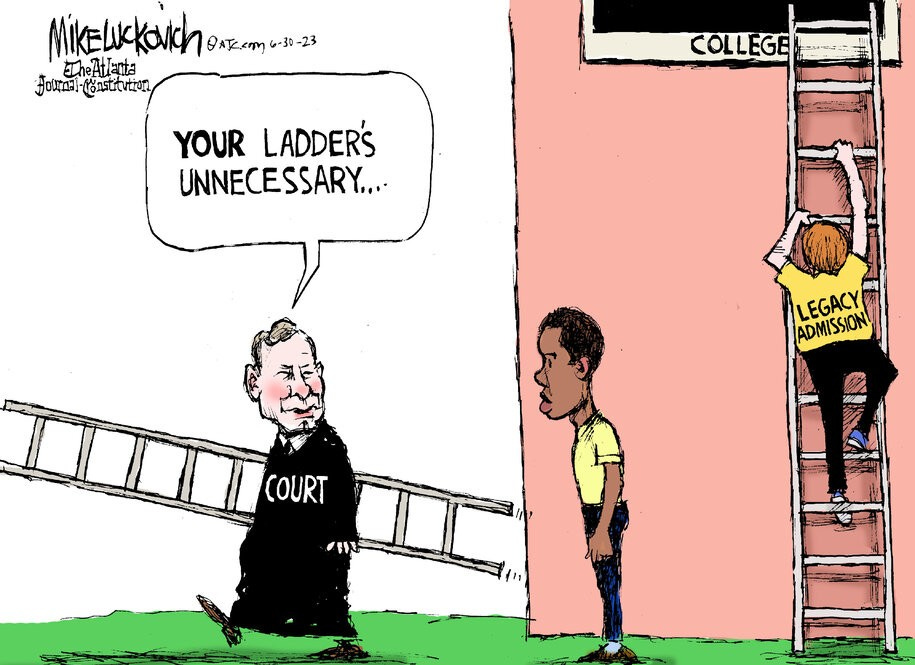
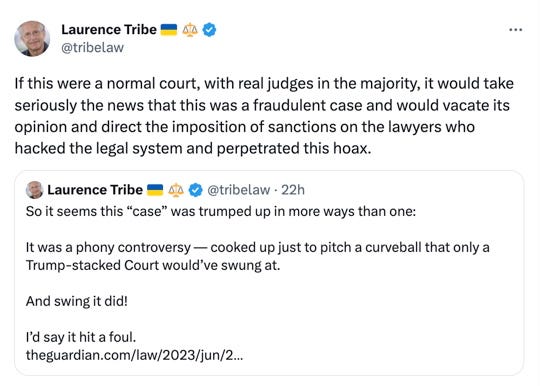
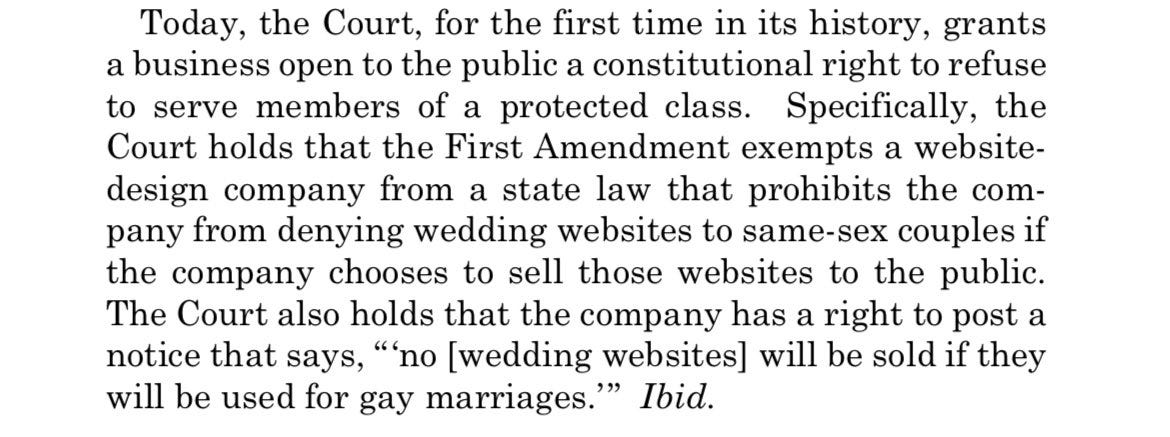
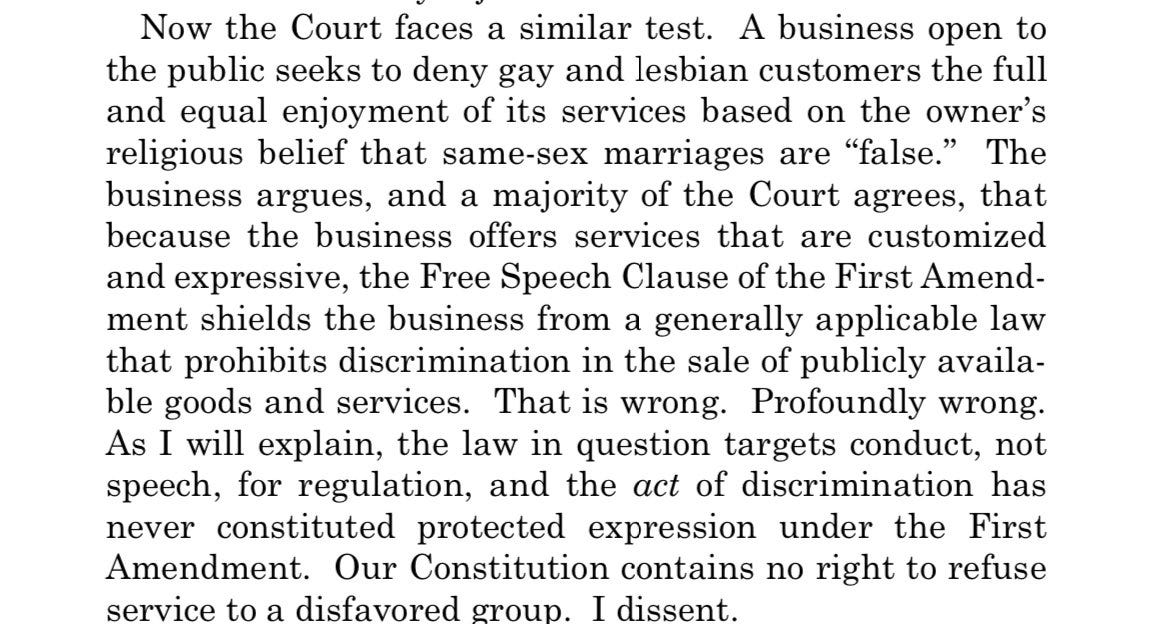
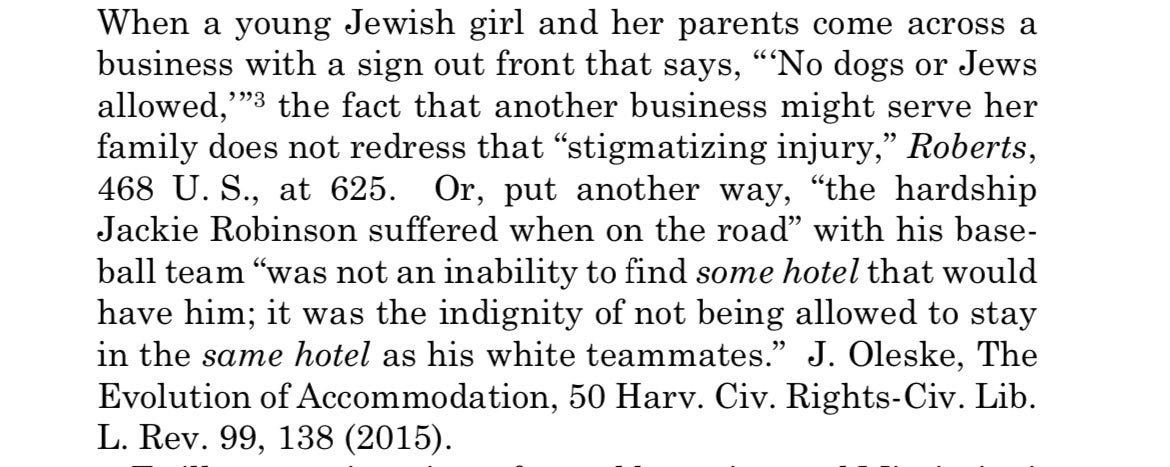
Then: During confirmation of the Trump appointees to the court - they said they couldn't comment on "hypotheticals."
Now: 303 Creative LLC v. Elenis based on a "phony controversy"
Thanks Joyce , no comments can say more than your writing. The nausea created by this court is unbelievable.